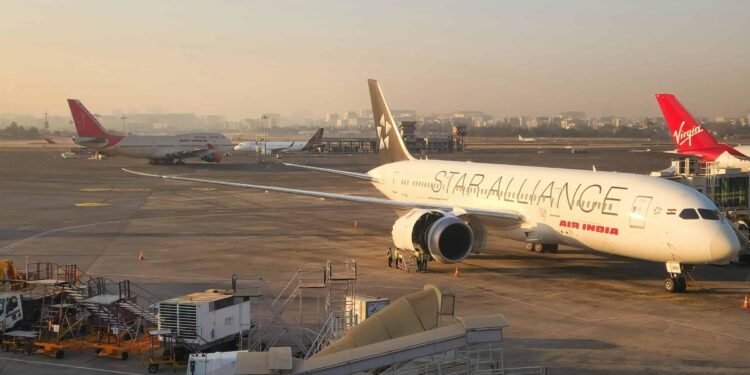In a developing storyline that has sparked intense debate, Air India finds itself at the center of a controversy following claims of a ‘near-miss runway tragedy’ involving Congress Member of Parliament KC Venugopal. The incident, which reportedly occurred during a landing at an Indian airport, has been met with vehement denial from the airline, which asserts that the allegations are unfounded. Venugopal, however, insists that Air India’s narrative is misleading, fueling accusations of misinformation and raising questions about air safety protocols. As details continue to emerge, the clash between the airline and the politician highlights broader concerns regarding aviation safety and accountability in India’s rapidly expanding air travel sector.
Air India Responds to Near-Miss Incident Allegations Amid Controversy
In a statement addressing the allegations surrounding a recent near-miss incident, Air India has strongly denied claims made by Members of Parliament, particularly KC Venugopal, who accused the airline of negligence leading to a potential tragedy on the runway. The airline asserted that all standard safety protocols were meticulously followed during the incident. “Safety is our utmost priority,” an Air India spokesperson emphasized, while detailing the procedures that were in place during the flight operation in question. The airline maintained that the incident was blown out of proportion and that their incident response system effectively managed the situation according to aviation regulations.
In response to the accusations, Air India provided detailed documentation to support its claims, including an account of the event and the measures enacted post-incident. The airline highlighted the cooperative exchange of information with relevant authorities to ensure full transparency. While Venugopal challenged Air India’s assertions, calling them “misleading,” the airline’s officials stressed their commitment to passenger safety and operational integrity. Below is a summary of key points from Air India’s response:
| Key Response Points | Details |
|---|---|
| Safety Protocols | All necessary safety protocols were diligently followed. |
| Incident Management | Effective management protocols were activated post-incident. |
| Transparency | Documentation provided to aviation authorities for review. |
KC Venugopal Accuses Air India of Misinformation Following Runway Claims
In a recent confrontation, Member of Parliament KC Venugopal has firmly rebutted Air India’s assertions regarding a purported incident involving a “near-miss” on the runway. The airline’s claims, which emerged following reports of a potentially catastrophic situation, have been labeled as “false” and “deceptive” by Venugopal. The MP criticized the airline for what he called an attempt to create confusion, arguing that the claims were misleading and did not reflect the reality of the situation.
Venugopal’s remarks have reignited the debate over safety protocols and transparency in commercial aviation. He emphasized the importance of public trust in airlines and highlighted several key points to support his stance:
- Accountability: Airlines must be held responsible for the accuracy of their statements.
- Safety Standards: Continuous evaluation of protocols is necessary to prevent actual near-misses.
- Public Awareness: Passengers deserve accurate information regarding their safety and the operations of airlines.
As the situation unfolds, it raises critical questions about communication integrity within the aviation industry, and many stakeholders are keenly observing Air India’s next steps in this ongoing dispute.
Ensuring Air Safety: Recommendations for Transparency and Accountability in Aviation Management
In a recent exchange that underscores the critical importance of transparency in aviation management, Member of Parliament KC Venugopal has accused Air India of being untruthful regarding safety claims. The airline reportedly denied allegations of a “near-miss runway tragedy” involving one of its flights, prompting heightened scrutiny over operational procedures and safety protocols within the airline industry. As air traffic continues to increase, ensuring that accurate information is communicated effectively is essential not only for regulatory compliance but also for maintaining public trust.
To enhance accountability and prevent similar incidents in the future, industry stakeholders should consider the following recommendations:
- Regular Audits: Implement independent audits of airline operations to identify and rectify lapses in safety protocols.
- Open Communication Channels: Establish clear lines of communication for whistleblowers to report safety concerns without fear of retribution.
- Data Transparency: Mandate public disclosure of near-miss incidents to keep passengers and stakeholders informed.
- Continuous Training: Ensure that all personnel receive ongoing training in safety management and emergency response.
To Conclude
In conclusion, the controversy surrounding the alleged near-miss runway incident involving Air India and the statements made by MP KC Venugopal continues to unfold. While Air India categorically denies the claims of a near-miss, asserting that the situation has been inaccurately portrayed, Venugopal remains firm in his stance, labeling the airline’s rebuttal as misleading. As this narrative develops, it underscores the critical importance of transparency and accountability within the aviation sector, particularly concerning passenger safety. Stakeholders are urged to await further investigations into the matter, which may provide clarity and potentially reshape public perception of both Air India’s operational safety and the validity of the claims made by public figures. The coming days will likely witness further discourse as both sides navigate the complex terrain of this emerging story.














